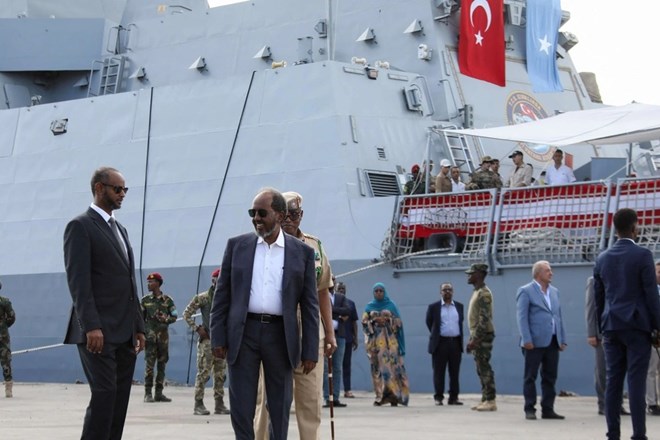
Friday October 18, 2024
By Michelle Gavin
In the Horn of Africa, the time is now for preventative diplomacy.

Somali President Hassan Sheikh Mohamud walks near a Turkish Navy Ship after it docked at the Mogadishu Sea Port following the signing of a defense and economic agreement between Somalia and Turkey in Mogadishu, Somalia on April 23, 2024. Feisal Omar/REUTERS
The last time the United States was on the cusp of a presidential election, conflict was looming in Ethiopia. Escalating tensions between the central government and the Tigray region exploded the day Americans went to the polls in November 2020, and a costly war ensued for the next two years, threatening the stability of the Ethiopian state. A cessation of hostilities agreement signed in 2022 brought an end to most of the carnage in Tigray, although a number of outstanding issues remain unaddressed, not least the return of displaced persons. Meanwhile, the coalition that Ethiopian Prime Minister Abiy Ahmed built to subdue Tigray fractured, and civil conflict continues to simmer in Amhara and Oromia. Today, the United States is again distracted by a tight presidential race, and multiple conflicts around the world are competing for our attention. It could be easy to overlook the dangers of tensions rising again in the Horn of Africa. Ethiopian Prime Minister Abiy Ahmed’s fixation on securing an outlet to the Red Sea, and his proven willingness to take big risks, have neighboring states springing into action. Abiy’s attempt to negotiate with Somaliland—a self-governing entity that seeks independence—for sea access poisoned the already historically fraught relationship between Ethiopia and Somalia. Egypt, still gravely concerned about the Grand Ethiopian Renaissance Dam and its impact on Nile waters, has seized on regional concerns to find new partners in its efforts to pressure Ethiopia, recently providing arms to Somalia. Eritrea, always interested in keeping its neighbors weak, also hosted talks with Egypt and Somalia.
Non-African powers with strong interests in the Red Sea and Gulf of Aden are not sitting on the sidelines. Turkey has renewed its close relationship with Somalia, while the United Arab Emirates remains close to Abiy. The complexity of the region and the web of influences that crisscross historically contested terrain makes the risk of miscalculation tipping into conflict particularly high. If that happens, the price will be paid first in African lives. It will then affect the global economy as commercially critical shipping lanes become less secure. Refugee flows will tax recipient countries. What happens in the Horn will reverberate globally.
The world certainly does not need more conflict. Already, Sudan’s brutally violent civil war is failing to attract attention and resources despite being the worst humanitarian crisis in the world, poised to become even more devastating as famine sets in. Somalia’s fragility continues to provide opportunity for al-Shabaab, which may be growing closer to Yemen’s Houthi militants. As difficult as it is when domestic politics loom large, the United States must urgently work to de-escalate tensions, discourage proxy conflicts, and prevent even more disaster.